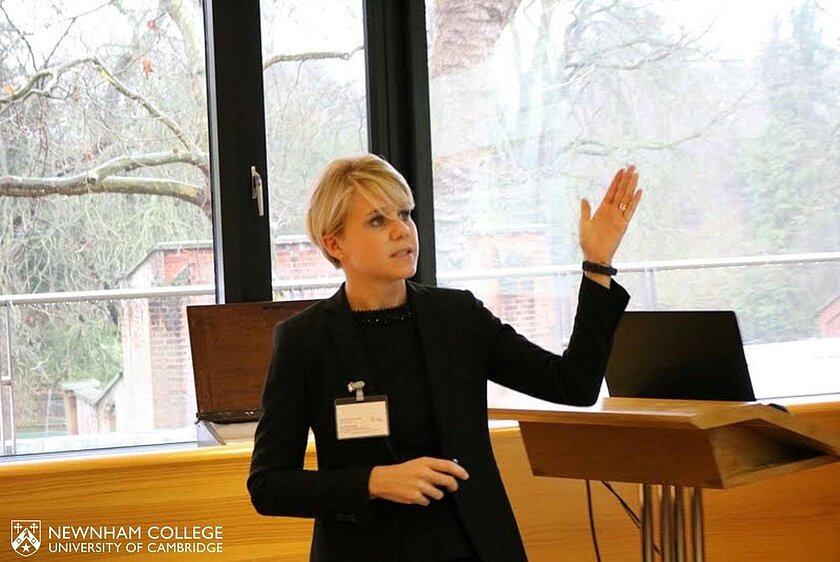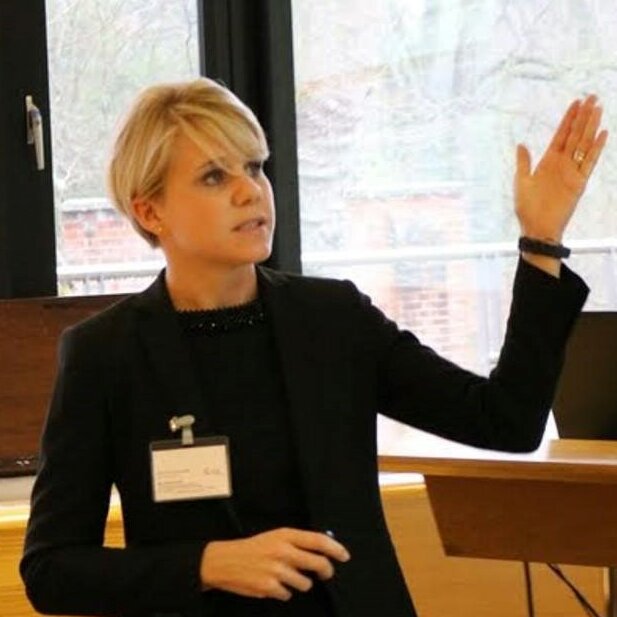Employer Branding
The employer brand is the image of a company anchored in the minds of (potential) employees. Employer branding as a targeted optimization of this image is a strategic lever that primarily works externally to attract applicants. At the same time, it also has an internal effect in order to bind employees emotionally, to ensure brand-compliant behavior and to deepen the desired values.

[1]
Starting as student assistant at the Centre for Growth and Sales Strategy
The first stone for Denisa Schill's future doctoral project will be laid during her bachelor's studies, where her penchant for sales management and marketing quickly becomes apparent. She supplements the two areas with a focus on market research - because it can be "wonderfully analytically underpinned", she explains. Her interest has been awakened: Denisa Schill wants to delve even deeper into the subject matter and immediately afterwards attends the HNU Master's degree program in Advanced Management (opens in a new window).
As with so many doctoral students, her path to a doctorate ultimately leads to a position as a student assistant, in her case at the HNU Centre for Growth and Sales Strategy (opens in a new window): "As a student, you simply lack the insight during studies: How does research actually work? How does the work at a chair work? How does a university function as an organization? As a student assistant you can quickly check whether the path to science is the right one for you".
[2]
The Employer Branding Award as inital ignition: the joy of data evaluation and practical derivations
The project work for the Employer Branding Award (opens in a new window) is something like the starting signal for her passion for scientific work: "I was thrilled by the procedure: Collecting data on a larger scale, defining parameters from them and calculating various correlations – and then getting exciting results that allow concrete conclusions to be drawn, that was something I found enormously exciting". So it made sense to go one step further and consider a doctorate. "I had been thinking about it for a long time," says Denisa Schill, and so she agrees when her future supervisor, Prof. Dr. Alexander Kracklauer (opens in a new window), offers her a position as a research assistant that is linked to a doctorate. "All the building blocks fit together with ease. But it was nevertheless clear to me that such a doctorate is a long way off," recalls the HNU alumna. She approaches this new stage with realistic expectations: "Five years is of course a long time that you might miss later in your professional life. The decisive factor for me was that the transfer of practical experience was always guaranteed: both at the chair and through the possibility of cooperating with a company on a project-by-project basis as an associated partner – having one foot in the business world was always possible". Together with her doctoral supervisor Prof. Dr. Kracklauer and her university second supervisor Prof. Dr. Christoph Rasche, who is working at the University of Potsdam, Denisa Schill combines elements from the employer branding and healthcare sector, narrows down her topic and develops research questions and project milestones.
[3]
A significant deficit: strategic HR management in the healthcare industry
Denisa Schill is not only interested in staying connected to the economy, but also in the ability to connect to the urgent questions of the present day. Her starting point: The blatant lack of specialists in the health economy, which, Denisa Schill emphasizes, was already a highly topical subject before COVID19, but with the pandemic it has become clearer where the German health system stands and where its limits have been reached. "Whether in nursing or among practicing physicians, in hospitals or in a country doctor's pracitce, there is a lack of skilled workers everywhere – and the situation will perspectively become even worse," explains Denisa Schill. One reason for this is that more and more women are working in this field, and therefore other working time models are in demand. On the other hand, weaknesses such as shift work or a lack of support in childcare or care for relatives keep potential practicing physicians away from hospitals and medical practices. Here the economist identifies a great need for action: "One would think that this would be reflected implicitly and explicitly in appropriate personnel measures. The reality, however, is that human resource management practice usually does not substantially deal with future developments". Denisa Schill explains that in many health care facilities, human resource management is seen (only) as a cost center; strategic human resource management with a decided market orientation is often still in its infancy.
[4]
Goal of employer branding measures: strengthening the employer brands of hospitals
Denisa Schill's doctoral thesis focuses on this core problem: It concentrates on the hospital sector, because the structure of a hospital is more similar to a company than a rural doctor's practice –and thus proven measures and recommendations can be derived from the economy. In this setting, she develops a holistic approach to solving the procurement problem of physicians in hospitals through targeted employer branding measures. This leads to many interviews: Denisa Schill interviews the people who practice in hospitals and hold management positions, who teach in the health care system, who work in a wide variety of specialties from surgery to midwifery – and she also includes the doctors-to-be for whom the planned measures are intended in perspective: The medical students in the early semesters. Aim of the interviews: To identify those attractiveness factors and to translate them into measures that are decisive for qualified workers to decide to practice in curative medicine – i.e. to work with and on people in hospitals instead of, as is often the case in Germany, moving to the consulting industry or migrating to countries with more lucrative earning opportunities or better research opportunities.
[5]
Cooperative test persons in a cooperative doctoral project
In addition to her own research project, Denisa Schill prepares lectures and supports seminars and transfer projects during her time as a research associate – a varied everyday working life with interesting professional exchange, but of course also a (labor-)intensive time. "This also requires a lot of tolerance in the family environment. This is not a matter of course", says Denisa Schill.
She not only receives support in private life, but also great support from her interviewees: "They are all people who are under a constant current, whose working day is meticulously timed – and yet they have agreed to give me an hour of their time and to be interviewed between two operations. That really thrilled me".
Such a willingness to cooperate naturally brings relief, says Denisa Schill, who had sleepless nights before the quantitative and qualitative part of her work: Will the required samples be taken and the responses returned within the desired time frame? Will the schedule working out? She also attributes the fact that everything went smoothly to the fact that her dissertation topic touches on such a pressing issue: "When the professor or the head physician told me that the topic was so important that one should habilitate about that - those were moments that really gave me the impetus I needed and showed that I had chosen exactly the right topic. Positive feedback was also received from the students who were also interviewed and who, as future doctors, are directly affected by the topic: "It's about our future, of course we're participating!".
[6]
Employer Branding: Denisa Schill's common theme in her resume and career planning
Denisa Schill has meanwhile brought her own future planning into the management of a medium-sized company, where she is responsible for strategic corporate development and able to contribute not only methodological knowledge from her doctoral thesis, but also thematic focuses. "In the field of employer branding, my current work offered starting in a green field: I was able to rebuild the topic – just not in the healthcare industry, but in a medium-sized company," explains Denisa Schill. But it is precisely these differences that she finds very exciting at the moment: "How many times a day I mentally switch back and forth between different subject areas fascinates me again and again." She cannot imagine an exclusive university career, says Denisa Schill –but the chair at a university of applied science is all the better for it: "The intensive practical relevance, the small groups – I think it's great to be close to the students and to be able to give them one or the other thing in values, in their own life and practical experience."
She would always do her docotorate again, she confirms. "You get to know completely different sides and strengths, but you also learn how to deal with the lows because they are inevitable. It is perfectly normal to reach a point during your doctorate where you doubt everything". For Denisa Schill, and this is a very important success factor for her, the PhD degree itself has always been secondary: "It doesn't take you very far to design new business cards on the very first day of your doctorate. The thing itself, the desire to do research, that should have priority – you have to be passionate about the topic."

Personal information
When I am not researching/working, then ...
... I do sports or spend time with my partner, my family and our dogs in nature.
Current reading:
"The Big Five for Life" and "What I've learned – Reflections on living a fulfilled life" by John Strelecky: books that make you think. In addition, I generally enjoy reading professional journals, such as "Absatzwirtschaft".
My area of expertise in three words:
market-oriented, creative and strategic
My next publication will be ...
I can hardly wait to write and research again. That's why I'm sure there will be more publications in the future. In the recent past, I supervised a bachelor student at IT sure. It is possible that a paper will be written with her and the supervising professor soon.
Scientific work/doctorate is ...
... an enrichment – both from a personal and a professional point of view. I would do it again.








